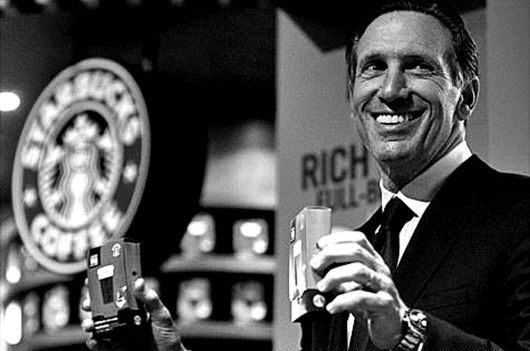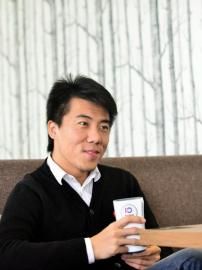Schultz: selling coffee while going to college and selling coffee after college?

Starbucks coffee CEO Howard Schultz. Expansion film
Whether it is the title of the old poor scholar, or the modern version of the factory security guard admitted to Tsinghua University, it is all a continuous copy of "Education changes fate." Now, Howard Schultz, CEO of Starbucks Coffee, wants to make the story more chicken soup, more inspirational and more jealous.
This week, Starbucks announced that it would spend $250 million on a partnership with Arizona State University to provide its employees with full tuition fees for online courses, giving them the opportunity to earn a bachelor's degree for free. Such generosity makes people feel: do you want to go to college for free? Let's go to Starbucks to sell coffee.
From the perspective of traditional economics, Schultz is quite right. As early as 1979, an economist with the same surname, Theodore Schultz, based on a systematic analysis of the impact of education investment on agricultural productivity and economic development, put forward the theory of human capital investment-through education, let workers master more knowledge and labor skills, so that they can get higher-paying and more valuable jobs in the market, and finally realize the realization of personal value and social and economic growth. Theodore Schultz won the Nobel Prize in economics for this research.
At present, young people around the world are facing the challenge of finding jobs. According to a recent report released by the International Labour Organization (ILO), suffering from the slow global economic recovery, 202 million people around the world are currently unemployed, and the unemployment rate will continue to rise in the next five years, and the number of unemployed is expected to increase by 3 million in 2015 alone.
"Don't worry about promotion and raise, go out and turn left to Starbucks." just as Schultz imagined using such a slogan to attract more young people to join, a heavyweight analysis report of the Brookings Institution led by former US Treasury Secretary Lawrence Summers slapped Schultz in the face.
After comparing the Gini coefficient and the Theil index, which measure American income growth and inter-group disparity between 1979 and 2013, economists are dismayed to find that although in the past 40 years, people with college degrees earn about $20, 000 more a year than workers without higher education, and more than $400000 more over their entire careers, but this change is effective only for people below middle income. On the other hand, it has little impact in the middle and high-income areas.
In other words, Schultz's sending young people with high school degrees who could only work in coffee shops to college can help them have better opportunities for better jobs, thus better conditions for raising children and alleviating the intergenerational transmission of poverty. But if you want to go to the pinnacle of your life to marry Bai Fumei and become an CEO, it is not enough to sell coffee to go to a free college. Therefore, Schultz's seemingly beautiful and noble employee education program is likely to end up with a "don't get confused when you graduate and apply for a job, go out and turn left to Starbucks."
However, Schultz has nothing to lose. Education is indeed an important way to improve employment, but equally indispensable and more important is the government's adjustment of the economic structure and the labour market. As for individuals, it is no longer important whether they go to college while selling coffee, or whether they can only sell coffee when they go to college. Before difficult times, whether it is selling coffee or going to college, as long as it brings you a better life, you have to fight for it. (source: Qilu Evening News)
Important Notice :
前街咖啡 FrontStreet Coffee has moved to new addredd:
FrontStreet Coffee Address: 315,Donghua East Road,GuangZhou
Tel:020 38364473
- Prev

Analysis of Chinese Coffee Market Nestle Starbucks Coffee Coffee Brand instant coffee
The heating up of China's coffee market stems from a certain demand space. According to the survey, the main consumers of coffee are urban workers. This part of the consumer group is also the leader of social fashion, they are interested in foreign food culture and easy to accept. In terms of economic strength, they can also afford this part of the cost. With the consumption of coffee, coffee culture came into being, and coffee
- Next

Start-up Coffee looking for "Chengdu partner"
An exclusive interview with Ma Lin, founder of ten coffee. There are private rooms in the coffee shop for entrepreneurial teams. Chengdu founder started his business three times, opened a coffee shop, set up a platform for young people to realize their dreams, took selfies with the mayor, and worked as a mentor at Jingrong Hui training Camp. Ma Lin, founder of Coffee, is now one of the most powerful founders in Chengdu. On the 9th, the head of the Jingrong training camp, the most important landing project of Jingrong Hui.
Related
- The ceremony is full! Starbucks starts to cut the ribbon at a complimentary coffee station?!
- A whole Michelin meal?! Lucky launches the new "Small Butter Apple Crispy Latte"
- Three tips for adjusting espresso on rainy days! Quickly find the right water temperature, powder, and grinding ratio for espresso!
- How much hot water does it take to brew hanging ear coffee? How does it taste best? Can hot water from the water dispenser be used to make ear drip coffee?
- What grade does Jamaica Blue Mountain No. 1 coffee belong to and how to drink it better? What is the highest grade of Blue Mountain coffee for coffee aristocrats?
- What are the flavor characteristics of the world-famous coffee Blue Mountain No. 1 Golden Mantelin? What are the characteristics of deep-roasted bitter coffee?
- Can I make coffee a second time in an Italian hand-brewed mocha pot? Why can't coffee be brewed several times like tea leaves?
- Hand-brewed coffee flows with a knife and a tornado. How to brew it? What is the proportion of grinding water and water temperature divided into?
- What is the difference between Indonesian Sumatra Mantinin coffee and gold Mantinin? How to distinguish between real and fake golden Mantelin coffee?
- What does bypass mean in coffee? Why can hand-brewed coffee and water make it better?

